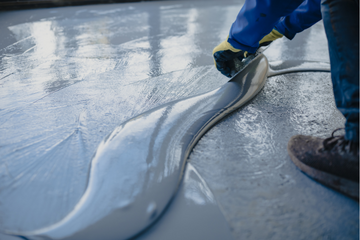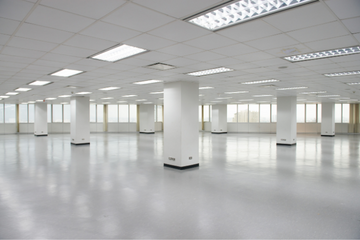Benefits of Epoxy Flooring

What is Epoxy?
Epoxy is a type of thermosetting polymer that is formed by the reaction between an epoxy resin and a hardener. It is commonly used in a wide range of applications due to its excellent bonding properties, durability, and resistance to chemicals, heat, and water.
Here are the main properties and applications of epoxy and its importance in various industries.
Epoxy resins are made from a combination of bisphenol A and epichlorohydrin. When the two chemicals are combined, they create a liquid or a solid polymer that can be used for a variety of applications. The epoxy resin is then mixed with a hardener, which triggers a chemical reaction that causes the mixture to harden and form a strong, durable bond.
One of the key properties of epoxy is its high strength and durability. This makes it an ideal material for applications that require a strong and long-lasting bond, such as in construction, automotive, and aerospace industries. Epoxy can also resist corrosion, making it an excellent choice for use in marine applications.
Another important property of epoxy is its resistance to chemicals and heat. Epoxy can withstand exposure to a wide range of chemicals, including acids, solvents, and fuels, making it an ideal choice for use in chemical processing and industrial applications. It is also able to withstand high temperatures, making it suitable for use in high-temperature environments, such as aircraft engines and industrial ovens.
Epoxy is also a popular material for use in art and crafts, particularly in the creation of jewellery, sculptures, and other decorative objects. Its ability to be molded into different shapes and its ability to be coloured and tinted make it a versatile material for creative projects.
In addition to its mechanical and physical properties, epoxy is also easy to work with. It can be mixed, poured, and molded into various shapes and sizes, and it can be used with a variety of substrates, including metals, plastics, and ceramics. It can also be applied to surfaces as a coating, providing an additional layer of protection and durability.
Epoxy is a versatile and important material that has a wide range of applications in various industries. Its strength, durability, resistance to chemicals and heat, and ease of use make it a popular choice for use in construction, automotive, aerospace, and industrial applications. Its versatility also makes it a popular choice for art and crafts projects.
As technology advances, the use of epoxy is likely to continue to grow, and it will remain an important material for a wide range of applications.

Why is Epoxy used for Flooring?
Epoxy flooring is a type of flooring material that is made from a combination of resin and hardener. When these two components are mixed together, they form a chemical reaction that creates a tough, durable, and long-lasting surface that is resistant to wear and tear, chemicals, and moisture.
Epoxy flooring is often used in industrial, commercial, and residential settings where durability and resistance to damage are essential. It is commonly used in garages, warehouses, factories, and hospitals, as well as in homes for basements, kitchens, and bathrooms.
Epoxy flooring is available in a range of colours and finishes, including high gloss, matte, and textured, which can be customised to suit the aesthetic and functional requirements of the space.
It is easy to clean and maintain and can last for many years with proper care.
What's The Difference Between Epoxy and Paint?
Epoxy and paint are two popular coating materials used in various applications, ranging from automotive and industrial to residential and commercial.
While both epoxy and paint provide a protective layer on surfaces, they differ in several aspects, including their composition, application, and performance.
The main differences between epoxy and paint are:
Composition:
Epoxy and paint are made up of different components.
Epoxy is a two-part system that consists of a resin and a hardener. When the two are combined, they create a chemical reaction that leads to a hard, durable, and high-strength coating.
Paint is typically made up of pigments, binders, solvents, and additives, which are mixed together to create a liquid that is applied to a surface.
Application:
The application process for epoxy and paint is different.
Epoxy is applied using a two-step process, where the resin and hardener are mixed together in a specific ratio, and then applied to a surface. The mixture has a limited working time, and once it starts to harden, it cannot be applied.
Paint, however, is applied using a one-step process, where the paint is directly applied to the surface using a brush, roller, or spray gun.
Performance:
Epoxy and paint differ in their performance characteristics.
Epoxy is known for its high strength, durability, and chemical resistance, making it suitable for use in industrial and commercial applications. It can withstand heavy traffic, harsh chemicals, and extreme temperatures. Epoxy is also resistant to abrasion, impact, and moisture, which makes it ideal for use on floors, walls, and other surfaces.
Paint, on the other hand, is less durable than epoxy and is prone to chipping, fading, and peeling. It is typically used for aesthetic purposes, such as adding colour and texture to surfaces.
Cost:
The cost of epoxy and paint also differs.
Epoxy is typically more expensive than paint, as it is a high-performance coating that requires specialized application techniques and materials. Additionally, the cost of labour for applying epoxy is typically higher than that of paint, due to the additional preparation and application steps involved.
In summary, epoxy and paint are two different coating materials that differ in their composition, application, performance, and cost. Epoxy is a high-performance coating that is known for its strength, durability, and chemical resistance, while paint is primarily used for aesthetic purposes. When deciding which material to use, it is important to consider the specific application and performance requirements, as well as the budget and timeline for the project.





